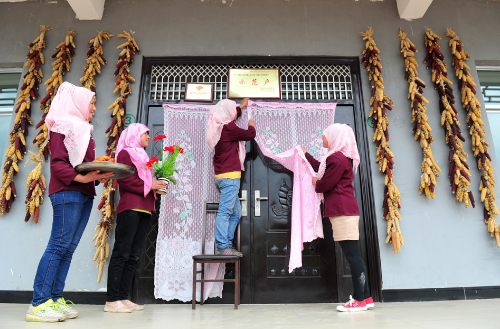|
 |
|
WELCOMING GUESTS: Villagers in Jingyuan County, Ningxia Hui Autonomous Region, decorate a family inn in their village on May 22, 2014 (XINHUA) |
A board showing pictures of 28 senior residents who have performed the haj pilgrimage stands at a park at the village gate.
Sixty-eight families comprising 620 people from the Hui ethnic group live in the village, which in 2013 was renovated under a government program devoted to the minority group.
Residents are Muslim Chinese, who make up nearly 36 percent of Ningxia Hui Autonomous Region's population of 6.4 million.
At a glance, there are no differences between the Hui and the majority Han Chinese. Members of both groups speak and write the Chinese language, wear Chinese attire and celebrate the Chinese Lunar New Year.
"We live in coexistence with the Han people here," said 41-year-old Hui Muslim Guo Zhanwu, a farmer who now rents his land to others.
He is of the third generation of his family to live in the village, sharing his house with his parents.
Guo said that as a member of a minority group, he has never endured discrimination. Hui Muslims are different from the Han only in religious habits, marriage traditions and diet, he said.
There are also several privileges, he adds. Hui Muslims are one of 55 ethnic minorities exempt from the government's one-child family planning policy.
He has three children: two daughters, 17 and 12 respectively, and a 5-year-old son.
The Chinese Government recognizes religious freedom, allowing the nation's more-than 1.3 billion people, including an estimated 23 million Muslims, to profess a faith as long as it is in line with the law.
Mosques boasting either Middle Eastern or Chinese architecture dot Yinchuan, the capital of Ningxia, and its surroundings. A six-century-old mosque in Tongxin county in Wuzhong has even been named a national cultural heritage site.
Ningxia has autonomy, allowing the introduction of several preferential policies for the Hui Muslims, including those related to boosting the local economy.
The government here has declared Idul Fitri a holiday, established graveyards for Muslims and allowed the Hui to appoint their own governors.
Wang Yuzhen, a Han Chinese woman working at WanTini, a family-run Muslim clothing factory in Wuzhong, said religious tolerance is evident in the factory, as well as the city.
"It's very pleasant to work here, where we interact like a family. We have lunch together in the factory's kitchen, which serves Muslim food," said Wang.
The factory, which exports its products to Egypt, Malaysia and Pakistan, employs more than 60 people, including about 30 Han Chinese.
"We coexist very, very well. There is no difference, except for our habits," said Wang, who lives in the city. She earns more than 2,000 yuan ($317) per month, higher than the standard living cost of 1,500 yuan ($238) in the city.
Yang Faxiang, the owner of WanTini, said that as part of a minority group he bought land for his factory in 1998 at a quarter of the normal price.
Ma Changbing, an official of Wuzhong, said that the Hui and Han live in harmony in the city and have not been affected by the recent attacks in Xinjiang Uygur Autonomous Region, home to a Muslim community in China's northwest.
"We live in unity here and [such incidents] do not concern us. We are among those demonstration zones, " Ma said.
"For me ethnic unity is the key to China's progress," said Yang Wenyuan, who also uses his Islamic name, Sulaiman. He condemned the attacks in Xinjiang, which he said were perpetrated by terrorists.
In Yongning, Muslims also said that they live in peace with other ethnic groups, facing no restrictions in performing their religious duties.
"It's easy to express our religious belief here," said Ma Yuefang, 70, on a visit to Najiahu Grand Mosque, one of the oldest mosques in China built in traditional Han style.
According to Ma, men come to the mosque to pray, while most women pray at home. However, a group of 20 to 30 women sometimes pray and recite the Koran at a separate hall in the mosque's compound.
An official of the mosque, Ding Yaoxian, said on normal day about 300 people visit and pray at the mosque, a figure that can swell to 1,000 on Fridays.
Jin Chunzi, Deputy Director General at the Department of Policies and Laws at the State Ethnic Affairs Commission, said protection of minorities, including Muslims, is the constitutional mandate of the Chinese Government.
Preferential policies for the minorities were introduced to keep the national unity of the world's most populous country.
"We practice three main principles with regard to relationship between the majority and minority groups. First is equality among all nationals. Second is respect and protection of religious groups, believes and minority groups. Third is assistance for minority groups and those living in less developed regions," she said.
She said her office has drafted laws and regulations to protect minorities and their religious beliefs in accordance with UN treaties on the protection of minority and indigenous rights.
For China, minorities are not a minor issue. As an old Chinese saying goes, minorities cannot live without the majority, the majority cannot live without the minorities and minorities cannot live without fellow minorities.
The article was first published by The Jakarta Post. Both authors are journalists of the Indonesian newspaper
| 